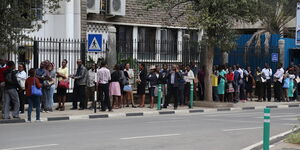A total of 24 Kenyan banks might shut down if the increment of core capital from Ksh1 billion to Ksh10 billion proposed in the Business Laws Amendment Bill, 2024, is effected in 3 years’ time.
While presenting its memoranda to the National Assembly Departmental Committee of Finance and Planning on Wednesday, the Kenya Bankers Association (KBA) stated that the increment will affect thousands of households.
According to the Association, the increment in core capital will affect 7,000 employees directly as well as worsen the economy. Additionally, 627 rental premises will be subjected to closure and the government will lose revenue in taxes.
The Bankers warned against introducing additional taxes on financial transactions stating that the effects will increase interest rates charged through loans to Kenyans.
The Business Amendment laws propose to increase banks’ core capital from Ksh1 billion to Ksh10 billion. According to KBA if the increment comes into effect, it will have an impact on the economy further exacerbating economic hardships.
Currently, banks are required to maintain a minimum core capital of Ksh1 billion. The proposed amendment seeks to raise this requirement tenfold to Ksh10 billion over a period of three years.
The Bankers Asociation observed the hike will affect 24 banks that require Ksh150 billion to meet the proposed thresh hold.
“24 banks extend loans currently to the tune of Ksh539 billion to the private sector representing 13 percent to the total loans that have been extended by all the banks to the private sector,” Raymond Molenje the acting Chief Executive Officer of KBA stated.
He further argued the move would not serve the purpose of strengthening the financial sector. “It will work counterproductively because Kenyans and businesses will not be served,” he added.
However, lenders have faced criticism for reducing credit to the private sector, particularly to Micro, Small, and Medium Enterprises (MSMEs) and SMEs, while instead directing their capital into lucrative government bonds for higher yields.
The Kenya Bankers Association (KBA) has requested the committee to allow a grace period of eight years for implementation. “We are requesting that we can be allowed to continue within eight years progressively so that we can reach the Ksh.10 billion in 2032.”
Deliberations on the Tax Amendment, Tax Procedures Law, and Business Amendment Laws are expected to shape the economy, including the formulation of the 2025/2026 budget-making process.












